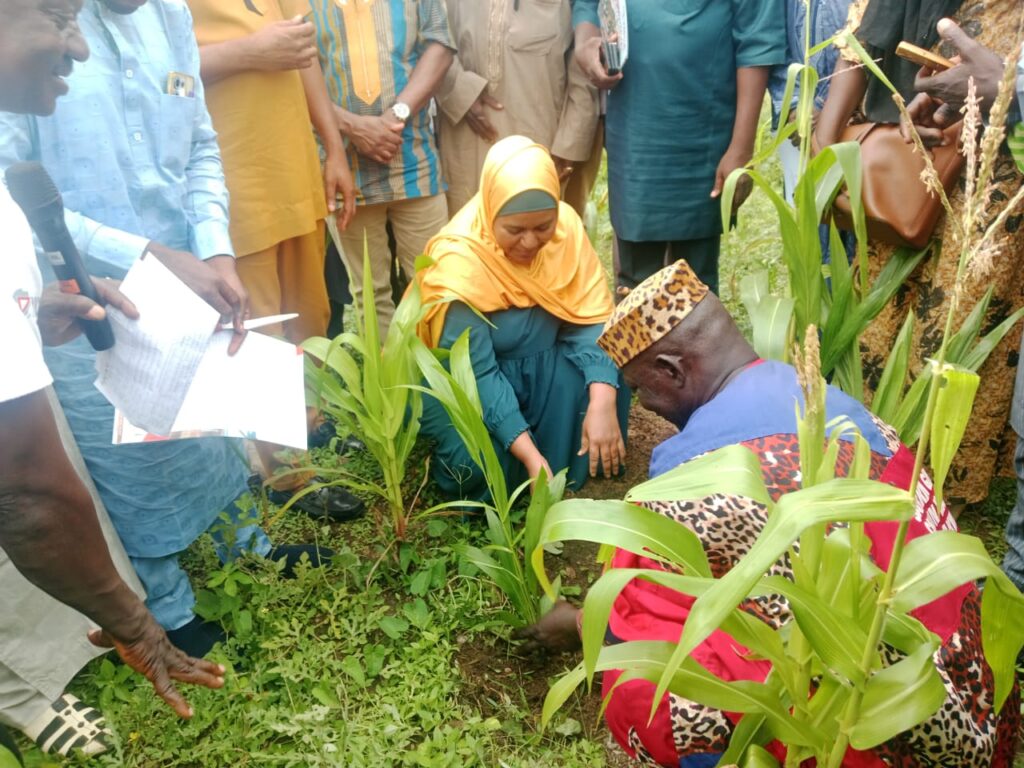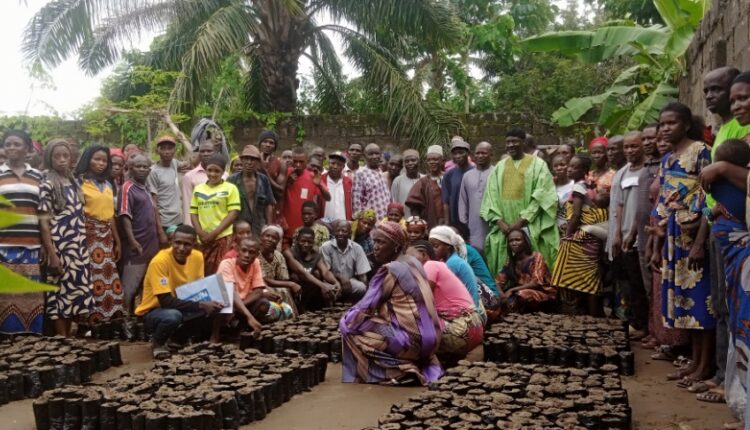How African Activists for Climate Justice strengthens resilience of climate-impacted women, youths in Nasarawa
|
Getting your Trinity Audio player ready...
|
A cross-section of the Musha community members during the nursery establishment in Obi LG of Nasarawa State
By Oboh Linus, Lafia
It is an indisputable fact that climate change has negatively impacted ecosystems and biodiversity, with its effects significantly affecting the livelihoods of vulnerable groups, especially women in Nigeria.
These impacts, such as environmental degradation, erratic rainfall patterns, dry spells, heat waves, erosion, flooding, deforestation, and desertification, are experienced yearly and greatly affect agricultural output and socio-economic activities.
Investigations revealed that Nasarawa State is one among many states in Nigeria where climate change threatens the livelihoods, health, and well-being of its citizens, especially small-scale women farmers, youths, and persons with disability in several communities.
Environmental experts raised serious concerns about the rampant degradation of the environment in Nasarawa state by human activities like indiscriminate cutting down of trees for logging and charcoal making, and bush burning which hugely contribute to the depletion of the ozone layer.
It is on this basis that the African Activists for Climate Justice (AACJ) project, funded by the Ministry of Foreign Affairs of the Netherlands and implemented by Oxfam in Nigeria, in collaboration with the Young Men’s Christian Association (YMCA) and the Association of Small-Scale Agro Producers in Nigeria (ASSAPIN), is supporting climate-impacted communities in Nasarawa State.
Kenneth Akpan, Climate Justice Project Coordinator at Oxfam in Nigeria, recently stated that AACJ is a Pan-African project being implemented in Nigeria, with Nasarawa State as one of the project locations.
Akpan said the goal of the project is to amplify and unite the voices of Africans, demanding that the most vulnerable groups; women, youths, and local Indigenous communities in the target countries to defend and realise their human rights. And also live a decent and dignified life in a healthy and sustainable environment within the context of climate emergency.

Assalama Sidi, Executive Deputy Director, Oxfam in Africa planting Oil Palm tree during the transplanting ceremony held in Akwanga
He said the project in Nasarawa state is aimed at building the resilience and capacity of climate-impacted communities, small holder women farmers, youth groups, vulnerable persons, and persons with disabilities to be able to take locally led actions to mitigate the effect of climate change.
Mrs. Asaba Averson, Coordinator, Advocacy for Women with Disabilities Initiative, Nasarawa State Chapter, who is a victim of a flood as a result of climate change said the AACJ project has significantly impacted her life and the lives of her group.
According to her, among the many benefits she got from the AACJ project are knowledge of tree planting, briquette production, nursery establishment and management, and sack farming using compost manure.
Mrs Averson said she utilised the training and the knowledge got from the AACJ project and started her sack farming, using compost manure in the backyard of her house, and also organised minni-training for her members.
She said she had planted yam, cocoyam, sweet potatoes, and vegetables, noting that the farm is thriving, all thanks to the AACJ training.
“When I was gathering the sand for my sack farming, some people in my community were asking if I was mad, why is she suffering herself to gather sand and put it into the sack to plant.
A cross-section of participants during the flag off of the 13, 500 oil palm tree transplanting held in Akwanga LG
“When the AACJ team visited my farm, I was so excited, some of these people in my community who were laughing at me then realised that my sack farm was a reality.
“Before now, persons with disabilities are seen as only dependants who have nothing to contribute or offer to the society, but it is a wrong impression,” she said.
Mrs Averson said that impressed by her farm, the AACJ team exclusively trained 50 women with disability in urban farming following her request to expand sack farming skills to help them grow their own food.
“Before now, people in my community didn’t know the disadvantage of cutting down trees indiscriminately for firewood and charcoal making, but with the coming of AACJ, we were enlightened on how cutting down trees can affect our lives.
“As a person with a disability who travels a distance with a tricycle, I need trees to rest under their shades before continuing my journey, so also is a person with albinism. There are no trees again to go and rest under their shades and it is affecting us,” she lamented.
Mrs Jummai Yohanna, Chairperson of the Smallholder Women Farmers Organization of Nigeria (SWOFON) in Nasarawa State, said that the AACJ project has greatly impacted her life and the lives of the members of her organization.
Yohanna said that through the AACJ project, she had learned briquette production and tree planting and noted that she is now using briquettes to cook as an alternative to charcoal.
She further said the AACJ project had strengthened her capacity in advocating for tree planting in her community as well as lending her voice to discourage indiscriminate cutting of trees.
“I use the knowledge gained to educate people, especially women in my community to plant trees, and that has improved tree planting in my community, I also educate them on the need for income diversification.
“This is because no matter the changes in the weather conditions, we will not be left without any harvest. The project also exposed us to smart agricultural practices so we can beat the climate change,” she said.
Mrs Janet Alanji, from Ntsakpe community, based in Akwanga, said the AACJ project had impacted her life, members of her organisation (ASSAPIN) and the community especially on tree planting and smart agriculture practices.
The AACJ project helped her diversify into other areas of agriculture, such as livestock rearing and crop processing of cassava, sweet potatoes, and groundnuts into different products.
Mrs. Alanji said she had extended the knowledge gained from ACCJ capacity building on briquette production, nursery establishment, and management to women in her community, and they are now planting trees and using briquette for cooking.
“I trained women on briquette production, I also encouraged them to go into urban farming, establish home gardens to produce vegetables and other crops such as sweet potatoes to combat hunger,” she said.
Daniel Alanji, a youth and one of the beneficiaries of the AACJ project, said they have learnt to plant trees, unlike before when cutting of trees for logging and charcoal making by the youths were the order of the day.
He further said he put to use the knowledge gotten from the open government partnership and lobby of the AACJ programme to attract an electricity transformer to the Agwadi community having suffered power supply for years, through a federal lawmaker representing his constituency.
He recounted a scenario at Gwange Loko community where the youths erroneously accused the elderly of witchcraft and being responsible for the erratic rainfall patterns and dry spells being experienced due to climate change.
He now follows seasonal predictions and cultivates climate change-resistant crop varieties, a method he has shared with his community for better yields.
Eze Faith-Adaeze, a youth, and beneficiary of the AACJ project, said it has provided her with an opportunity to know about climate change as it affects the environment and built her capacity for tree planting and briquette making.
“I also shared the knowledge of tree planting with the young people in my community, they are now planting economic trees to serve as a source of income to them and also reduce climate impacts on our environment.
“The AACJ also offers me an opportunity to join other African youths in Nairobi to share knowledge and engage youths in games activities to dissuade them from breaking the law,” she said.
Hellen Jonathan, From Agunji Community in Nasarawa Eggon Local Government, said the project had impacted her so much, noting that she used the knowledge got from oil palm nursery establishment and management to plant over 100 oil palm trees on her own.
According to her, before now she and her community had little or no knowledge of tree planting but now, they are seriously interested in tree planting after the ACCJ capacity building training.
She said she had mobilized her community to plant varieties of trees to mitigate the impact of climate change. ” Aside from tree planting we learnt how to make briquette, and we are now using briquette to cook in the community.
Assalama Sidi, Executive Deputy Director, Oxfam in Africa, while speaking recently in Akwanga
during the distribution of 13,500 oil palm seedlings for transplanting in 9 communities said she was impressed with AACJ project implementing partners, YMCA and ASSAPIN.
“This is just a great opportunity for me because I’m able to see a great project, a project on fighting a climate change effect with all the community members. And the project is great because the project idea came from the communities.
“So, seeing people who are already conscious about climate change means, people are willing to fight against climate change. People have not only a short time but a long-time vision, so I’m impressed,” she said.
Mr Ango Adamu, Executive Secretary, YMCA Mada Hills while speaking recently said the project had supported the establishment of nine Oil palm nurseries in 5 LGAs; Akwanga, Kokona, Lafia, Nasarawa Eggon, and Obi, noting that each of the nine communities has 1,500 amounting to 13,500.
He listed the nine benefiting communities to include Agunji and Ngubi communities, Nasarawa Eggon, Ntsakpe and Buhar Community, Akwanga, Gidigidi Community, Kokona, Gidan mai Akuya, and B.A.D community, Lafia, Musha, Obi.
Adamu disclosed that AACJ had graciously approved to scaling up the Oil palm nursery establishment to additional 5 communities: Tundun Adabu community in Obi LGA, Tilla, community in Keffi LGA, Alawaza, in Doma, LGA, Angwan Kafinta in Wamba LGA, and Sarkin Noma community in Keana LGA.



Comments are closed, but trackbacks and pingbacks are open.